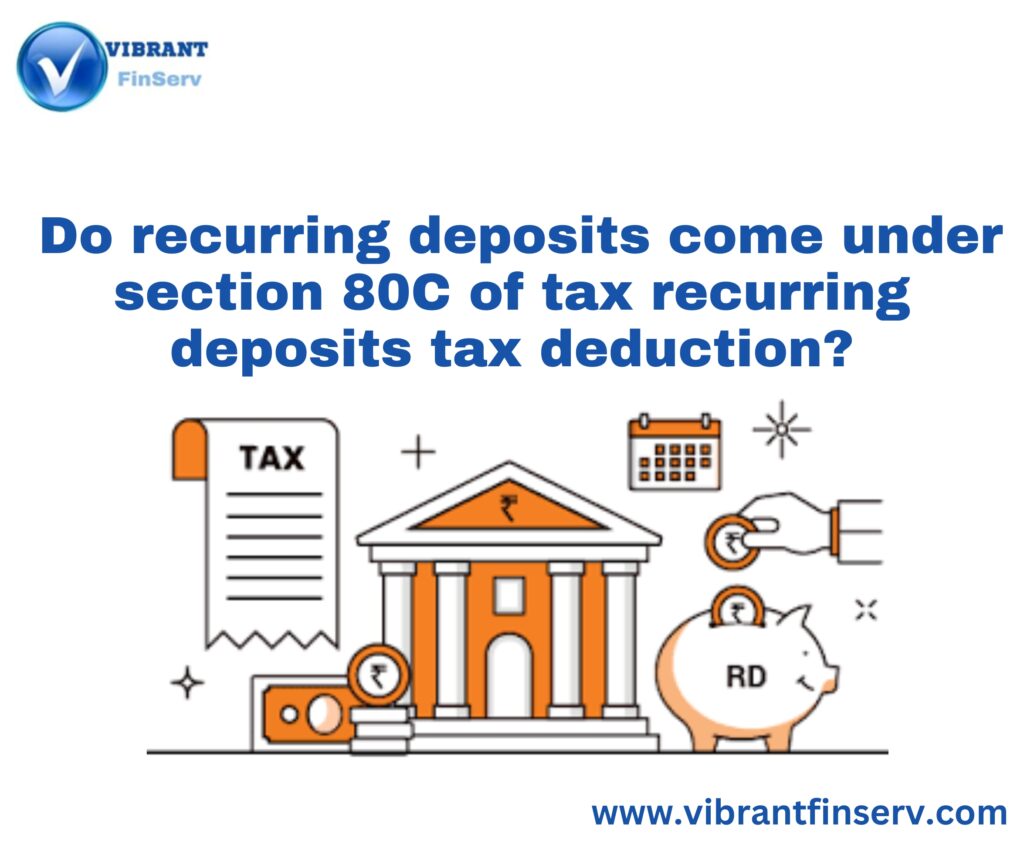Recurring Deposits tax deduction
Recurring deposits (RDs) are a popular savings instrument offered by banks and financial institutions, allowing individuals to save a fixed amount regularly over a specified period. Many investors wonder whether the contributions made to recurring deposits are eligible for tax deductions under Section 80C of the Income Tax Act in India.
What is Section 80C?
Section 80C of the Income Tax Act is a provision that allows taxpayers to claim deductions from their taxable income for certain investments and expenses. Section 80C aims to encourage savings and investments by providing tax benefits on various financial products.
Financial Products Eligible Under Section 80C
The following financial instruments and expenses are eligible for tax deductions under Section 80C:
- Equity Linked Savings Schemes (ELSS)
- Public Provident Fund (PPF)
- National Savings Certificate (NSC)
- 5-Year Fixed Deposit with Banks
- Employee Provident Fund (EPF)
- Tax-saving Fixed Deposits
- Life Insurance Premiums
- Principal Repayment on Home Loan
- Sukanya Samriddhi Yojana
- Senior Citizens Savings Scheme (SCSS)
Are Recurring Deposits Eligible for Section 80C?
No, recurring deposits do not qualify for tax deductions under Section 80C of the Income Tax Act. Although recurring deposits are a safe and disciplined way to save money, they do not fall under the list of eligible investments for tax benefits under this section.
Why Are Recurring Deposits Not Covered Under Section 80C?
Recurring deposits are not included in Section 80C for the following reasons:
- Nature of Investment: Recurring deposits are considered traditional savings instruments rather than investment vehicles. They are primarily used for saving money rather than for tax planning or investment growth.
- Interest Income Taxation: The interest earned on recurring deposits is taxable as income from other sources, and the amount is subject to tax according to the applicable income tax slab rates. This treatment differs from tax-saving investments under Section 80C, which often offer both deductions and tax-free returns.
- Lack of Growth Potential: Many of the instruments eligible under Section 80C offer potential for higher returns or capital appreciation. Recurring deposits generally offer fixed interest rates and are not associated with growth potential, unlike investments like ELSS or PPF.
Alternative Tax-Saving Instruments
If you are looking for tax-saving options under Section 80C, consider the following alternatives:
- Equity Linked Savings Schemes (ELSS): These are mutual funds that offer potential capital appreciation along with tax benefits. Investments in ELSS are eligible for tax deductions under Section 80C.
- Public Provident Fund (PPF): A long-term savings scheme with tax-free interest and maturity proceeds. Contributions to PPF are eligible for deductions under Section 80C.
- 5-Year Fixed Deposits with Banks: Fixed deposits with a tenure of 5 years qualify for tax deductions under Section 80C.
- Life Insurance Premiums: Premiums paid for life insurance policies for self, spouse, or children can be claimed under Section 80C.
- National Savings Certificate (NSC): A fixed-income investment scheme that offers tax deductions under Section 80C.
Conclusion
While recurring deposits are a valuable tool for disciplined savings, they do not qualify for tax deductions under Section 80C of the Income Tax Act. If you’re looking to benefit from tax deductions, consider exploring other eligible investment options such as ELSS, PPF, or tax-saving fixed deposits. By diversifying your investments and making informed choices, you can effectively plan your finances and optimize your tax benefits.
FAQs
- Are recurring deposits eligible for Section 80C tax deduction?
No, recurring deposits are not eligible for tax deductions under Section 80C. - What is Section 80C?
Section 80C is a provision in the Income Tax Act allowing deductions for certain investments and expenses up to ₹1.5 lakh per financial year. - Can I claim tax benefits on the interest earned from recurring deposits?
No, the interest earned on recurring deposits is taxable as income from other sources. - What types of investments qualify for deductions under Section 80C?
Investments such as ELSS, PPF, NSC, 5-year fixed deposits, and life insurance premiums qualify for deductions under Section 80C. - Do recurring deposits provide tax-free interest?
No, the interest earned on recurring deposits is subject to tax as per the applicable income tax slab. - Is there any tax benefit for depositing money into a recurring deposit account?
No, deposits in recurring deposit accounts do not provide tax benefits. - What are some alternatives to recurring deposits for tax savings under Section 80C?
Alternatives include ELSS, PPF, 5-year fixed deposits, and life insurance premiums. - Does the maturity amount of recurring deposits get taxed?
Yes, the maturity amount, including interest, is subject to tax. - Can I use recurring deposits for financial planning?
Yes, recurring deposits are useful for disciplined savings but do not offer tax benefits. - Are there any tax-saving features in recurring deposit accounts?
No, recurring deposit accounts do not have tax-saving features.
For more information, visit this site: https://www.incometax.gov.in/
For further details access our website https://vibrantfinserv.com/

